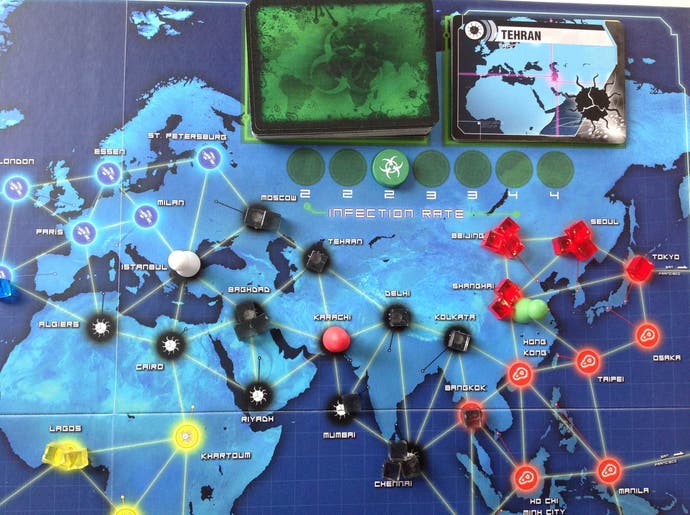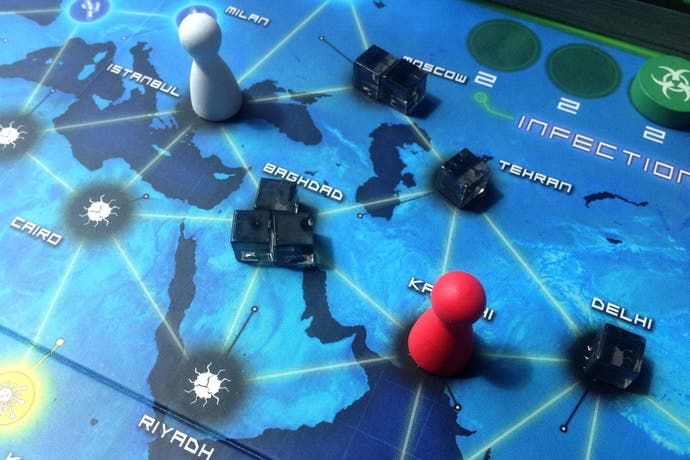The strange joy of failure in Pandemic
Fancy another go?
Whenever I get the chance to speak to strategy game designers, I always ask them about victory conditions. What's the best way - the right way - to let a player bring to a close a game that may have eaten up an entire weekend?
Strategy designers tend to be ceaselessly honest and self-critical, and they'll often admit that there is no right way where victory is concerned, just a series of wrong ways that all contain a certain distinct merit. If you look at Civilization, for example, the victories tend to shift around from one iteration to the next. Even Domination - kill every other player - has changed a little over the years. Winning is tricky stuff.
Last weekend I spent an evening playing the board game Pandemic, and I'm starting to wonder if I've been asking the wrong question all of this time. Pandemic is an unusual strategy game for sure: it's co-operative, for one thing, so it's a case of all players fighting against the board. It's also a pleasantly swift business. We had two matches over the course of the evening, and given my peculiar ability to misunderstand every rule I'm told about in a board game, that's borderline miraculous. Here's something else that's miraculous: we lost both games, and it was still amazingly satisfying.
So, while Pandemic may be too special a case to extract any meaningful principles from, It's still worth thinking about, because satisfying defeat is always worth thinking about. I love games that you can lose - they seem to have so much more integrity than games that simply want to tell you a set story, often regarding how brilliant you are. A game that allows you to lose while still leaving you with something that feels valuable? That's even better.

Pandemic only has one victory condition, and it's laudably straightforward. All players form a team of scientists struggling to rid the world of four infectious diseases that are spreading over the globe racing from one city to the next. Research all four cures and you're basically done, but you do that by making what essentially amounts to a series of rummy hands, a different colour for each disease, and that takes time and co-operation.
Muddying things is the fact that you need to keep the diseases themselves in check as you seek their cures. Here's where the defeat conditions come in. Pandemic has three of them, and they're all related. Firstly, you lose a game if you suffer eight separate outbreaks, which are events that occur when a city gets more than three disease cubes placed on it. You can also lose if you run out of disease cubes for a specific disease, regardless of where they're placed on the board. Finally, you lose if you run out of player cards, which are drawn each turn. Player cards contain the city cards you'll need to make your rummy hands, as well as epidemic and event cards, which either kick the spread of disease up a notch or give you one-shot tools to deal with catastrophes.
There are a number of reasons why these defeat conditions are so elegant, and the first is that, although they revolve around abstractions like outbreak timelines, playing pieces and cards, they map to the game's theme enormously well. Eight outbreaks tells you that you've failed to contain the diseases you're up against, but so does running out of disease cubes, the little coloured pieces of wood that you place on the board as infection increases. Player cards, meanwhile, tell you that you're running out of time in general. You're dallying in the face of chaos, and you shouldn't be able to dally forever.
On top of that, there's the fact that all of these disease conditions are extremely easy to monitor. They're tangible. Where is the Outbreak timeline at? Four? I'd better get my doctoring skates on. How many disease cubes are left? Almost none. How did we get so low on player cards? By playing really badly. There are untold benefits to playing a physical board game, of course, from the ease with which players around the table can slip in and out of their roles to the way that randomising elements gain a certain integrity by being physically manipulated - the shuffling of decks, the rolling of dice. This is another I had noticed before, though: it's much easier to keep track of where you are and how you are doing when nothing is hidden behind the screen.
As distinct as Pandemic is, however, I still feel that there are lessons here that other games can learn from. Defeat is as important as victory: in the case of Pandemic it makes the game snappy and dynamic and responsive. It's a pursuing force in the game, and there are so many ways that it pursues you. On top of that, defeat always feels fair, because it is so tightly bound to the central theme, of battling with diseases that want to spread and overwhelm. Defeat conditions can shape a game just as powerfully as victory can. Weird as it sounds, it might be where the best stories are lurking.

